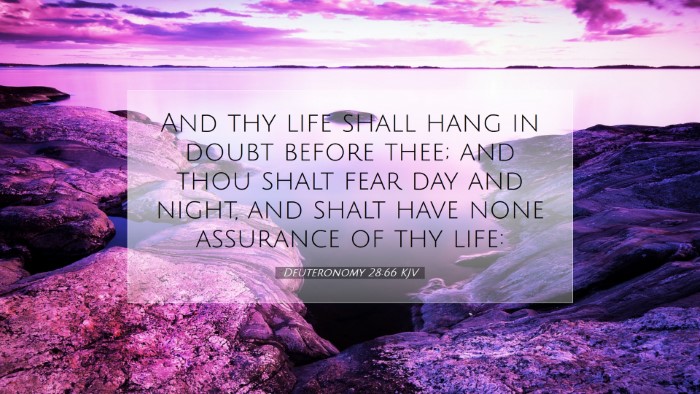Commentary on Deuteronomy 28:66
Deuteronomy 28:66 states:
"And thy life shall hang in doubt before thee; and thou shalt fear day and night, and shalt have none assurance of thy life."
Overview
In this verse, the Lord forewarns Israel of the consequences of disobedience to His commandments. The context of this verse lies within a broader discourse on the blessings of obedience and the curses that befall those who turn away from God. This verse starkly illustrates the depth of despair and uncertainty that ensues when one deviates from God's covenant.
Theological Significance
Deuteronomy 28:66 serves as a dire warning and a reflection on the relationship between obedience and the divine favor of God. It underscores several key theological insights:
-
Divine Judgment: The verse illustrates the principle that divine blessings are contingent upon adherence to God's commands. Matthew Henry notes that the catastrophic consequences of disobedience are designed to evoke a sense of urgency in the people to return to faithfulness.
-
Existential Anxiety: Albert Barnes comments on the psychological implications of living in rebellion against God. The absence of assurance leads to a state of constant fear, impacting not only the spiritual condition but also the mental well-being of the individuals involved.
-
Life Without Assurance: Adam Clarke highlights how this lack of assurance can permeate every aspect of life. The Israelites, faced with an uncertain future, are reminded of the peace that comes from enjoying a covenant relationship with God, contrasting sharply with their despair in disobedience.
Exegesis and Interpretation
The phrase "thy life shall hang in doubt" can be interpreted as signifying the fragility of life when one is out of sync with divine will. It suggests that one's existence is precariously balanced upon the decisions made in defiance of God's law. This interpretation aligns with Clarke’s understanding that spiritual disobedience leads to a tangible consequence—an instability in both physical and spiritual realms.
Historical Context
This verse is situated in the final speeches of Moses to the Israelites, emphasizing the last opportunity for the people to commit to the covenant before entering the Promised Land. The covenant blessings and curses outlined in Deuteronomy serve as foundational elements of the relationship between Israel and Yahweh. The historical setting highlights the necessity of vigilance and loyalty to God's statutes amidst the challenges of settling in a new land where their faith could be tested.
Literary Features
The verse employs stark imagery to convey the gravity of disobedience. The repetition of "fear" coupled with the uncertainty concerning "thy life" evokes a powerful emotional response. The contrast between fear and assurance serves as a rhetorical device to impress upon the reader the dire consequences of turning away from God. Henry remarks on the poetic nature of the curse, which serves to engrain the consequence of rebellion within the collective memory of the Israelites.
Application for Believers
For contemporary believers, this verse acts as a cautionary tale. The theological truths embedded within emphasize that disobedience leads to a loss of peace and security. Scholars and pastors may find the following applications particularly relevant:
-
The Importance of Obedience: Believers are reminded of the call to live according to God's commands, reflecting the relationship between faith and daily living.
-
Understanding Consequences: The notion that sin has tangible consequences, such as anxiety and fear, can guide believers to seek restoration in their relationship with God to regain peace.
-
Encouragement for the Weary: In moments of doubt and fear, this passage can offer comfort by reaffirming that assurance lies in an obedient and faithful relationship with God.
Conclusion
Deuteronomy 28:66 stands as a sobering reminder of the spiritual and existential ramifications of turning away from God. The insights provided by Matthew Henry, Albert Barnes, and Adam Clarke illuminate the richness of this verse, encouraging a deep, reflective engagement with the text by pastors, students, and theologians alike. The promise of assurance, peace, and life rests firmly upon the foundation of obedience to God, an enduring truth that resonates through the ages.


